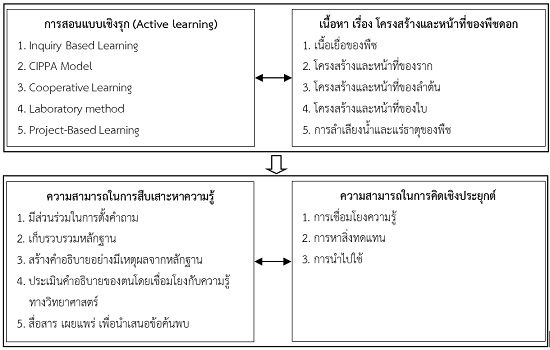A STUDY OF STUDENT COMPETENCE IN CONDUCTING SCIENTIFIC INQUIRY AND APPLICATION THINKING IN BIOLOGY ON THE ANATOMY OF FLOWERING PLANTS BASED ON AN ACTIVE LEARNING APPROACH: A CASE STUDY OF GRADE 11 STUDENTS
DOI:
https://doi.org/10.14456/nrru-rdi.2021.44Keywords:
Inquiry, Applicative thinking, Active learningAbstract
The purposes of this research were to compare the ability to inquire knowledge and compare the ability to use applicative thinking in grade 11 students before and after undergoing active learning. The samples were made up of 90 grade 11 students in Sciences-Mathematics program at the Demonstration School of Ramkhamhaeng University in their 1st semester of 2018 academic year through a purposive sampling method. The tools of the research consisted of 1) 5 active-learning for biology lesson plans under the topic Structures and Functions of Flowering Plants, 2) a test measuring the ability to inquire knowledge, and 3) a test measuring the ability to use applicative thinking. All of the test scores were then analyzed to find the means, the standard deviations (SDs), and the One Samples T-test. The results showed that: 1) In terms of the ability to inquire knowledge of the grade 11 students before and after undergoing the active learning, the average score after the active learning was increased by 9.44, with the SD of 2.40, and this increase was found to be statistically significant at the 0.05 level, and 2) In terms of the ability to use applicative thinking of the grade 11 students before and after undergoing the active learning, the average score after the active learning was increased by 10.26, with the SD of 1.95, and the increase was found to be statistically significant at the 0.05 level.
References
Bransford, J., Brown, A., & Cocking, R. (Eds.). (2003). How people learn: Brain, mind, experience, and school. Washington, DC : National Academy Press.
Chareonwongsak, K. (2011). Applicative Thinking (5th ed.). Bangkok : Success Media. (In Thai)
Chiu, P. H. P., & Cheng, S. H. (2017). Effects of active learning classrooms on student learning: a two-year empirical investigation on student perceptions and academic performance. Higher Education Research & Development, 36(2), 269-279.
Collins, J., & O' Brien, N. (2003). The Greenwood Dictionary of Education.Westport, CT : Greenwood.
Dachakupt, P., & Yindeesuk, P. (2013). 5C Skill for unit development and standard-based teaching and learning management (7th ed.). Bangkok : Chulalongkonrn Educational Preview. (In Thai)
Felder, R. M., & Brent, R. (2009). Active learning: An introduction. ASQ Higher Education Brief.
Hongsakun, W. (2018). Active learning management in Thailand 4.0. In Graduate School Conference 2018 (pp. 479-485). Bangkok : Suan Sunandha Rajabhat University. (In Thai)
Hyun, J., Ediger, R., & Lee, D. (2017). Students' Satisfaction on Their Learning Process in Active Learning and Traditional Classrooms. International Journal of Teaching and Learning in Higher Education, 29(1), 108-118.
Insook, S., Ajchariyasakchai, A., & Imthap, R. (2016). Active Learning Instructions in Biochemistry for Thailand Qualification Framework for Higher Education at Boromarajonani College of Nursing Buddhachinaraj. In The 3rd National Conference and Research Presentation 2016 (pp. 192-200). Nakhon Ratchasima : Nakhon Ratchasima College. (In Thai)
Kulpuang, J., Chauvatcharin, N., & Sirisawat, C. (2016). A Study of Biology Learning Achievement and Attitude Towards 5Es-Leaning Cycle With Active Learning Activities of 12th Grade Students. Journal of Education Naresuan Uiversity,18(3), 265-275. (In Thai)
Laowreandee, W. (2013). Thinking skills instructional models and strategies. Nakhon Pathom : Faculty of Education, Silpakorn University. (In Thai)
Mankilik, M., & Ofodile, U. C. (2015). Effects of Hybrid Active Learning Strategy on Students’ Understanding of Direct Current Electricity Concepts in Nigerian Secondary Schools. International Journal of Learning, Teaching and Educational Research ,13(2), 77-87.
Piangduangjai, N. (2017). The Development of Instructional Science Model by using Project-based Learning through Inquiry-based Learning by Flipped Classroom Approach to Enhance Creative Innovation Ability and Scientific Minds on Ninth Grade Students silpakorn educational research journal. Silpakorn University, 9(2), 190-202. (In Thai)
Royal Academy. (2012). A-LAlphabet Education Dictionary, Royal Institute Dictionary. Bangkok : Arun Printing. (In Thai)
Saiyos, L., & Saiyos, A. (1995). Techniques of Educational Research (4th ed.). Bangkok : Suriwiyasat Press. (In Thai)
Schleicher, A. (2015). Schools for 21st-Century Learners: Strong Leaders, Confident Teachers, Innovative Approaches, International Summit on the Teaching Profession, OECD Publishing. http://dx.doi.org /10.1787/9789264231191-en
Sompuet, P. (2016). Organized Active Learning By Instructional Model With Case-Based. Phranakhon Rajabhat Research Journal Humanities & Social Sciences, 11(2), 260-270. (In Thai)
Tangmesri, J. (2015). Development of Grade 5 Students’ Learning Achievement and Science Process Skills by Using Inquiry Instructional Model. Journal for Social Sciences Rrsearch, Nakhon Pathom Rajabhat University, 6(1), 5-22. (In Thai)
The institute for the Promotion for Teaching Science and Technology. (2014). PISA 2012 Assessment Mathematics Reading and Science, The Institute for the Promotion of Teaching Science and Technology. Bangkok : Arun Printing. (In Thai)
Thongaime, A. (2018). Project Based Learning For Developing Student in The 21st Century. Valaya Alongkorn Review (Humanities and Social Science), Valaya Alongkorn University, 8(3), 185-198. (In Thai)
Wongpibool, P. (2017). Active Learning. Journal of Yanasangvorn Research Institute Mahamakut Buddhist University, 8(2), 327-336. (In Thai)
Wu, H., & Hsieh, C. (2006). Developing sixth grades’ inquiry skills to construct explanations in inquiry-based learning environments. International Journal of Science Education, 28(11), 1289-1313.
Yentour, S., & Yamkasikorn, M. (2019). Conceptual for Develop Noveland Adaptive ThinkingSkills in TeacherStudents. Journal of Research and Curriculum Development. Srinakarintarawirot University, 9(1), 139-153. (In Thai)





